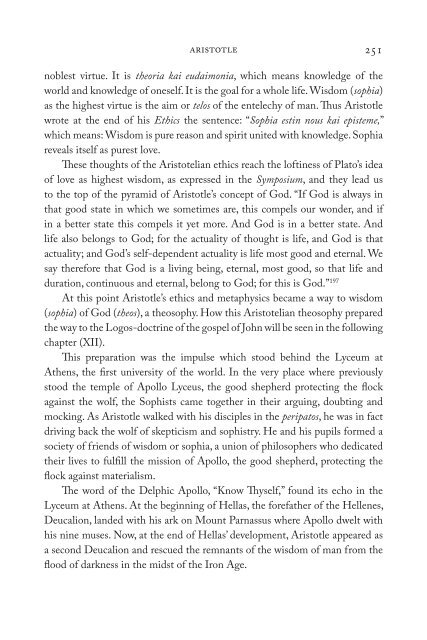The Gospel of Hellas - Research Institute for Waldorf Education
The Gospel of Hellas - Research Institute for Waldorf Education
The Gospel of Hellas - Research Institute for Waldorf Education
You also want an ePaper? Increase the reach of your titles
YUMPU automatically turns print PDFs into web optimized ePapers that Google loves.
aristotle<br />
noblest virtue. It is theoria kai eudaimonia, which means knowledge <strong>of</strong> the<br />
world and knowledge <strong>of</strong> oneself. It is the goal <strong>for</strong> a whole life. Wisdom (sophia)<br />
as the highest virtue is the aim or telos <strong>of</strong> the entelechy <strong>of</strong> man. Thus Aristotle<br />
wrote at the end <strong>of</strong> his Ethics the sentence: “Sophia estin nous kai episteme,”<br />
which means: Wisdom is pure reason and spirit united with knowledge. Sophia<br />
reveals itself as purest love.<br />
<strong>The</strong>se thoughts <strong>of</strong> the Aristotelian ethics reach the l<strong>of</strong>tiness <strong>of</strong> Plato’s idea<br />
<strong>of</strong> love as highest wisdom, as expressed in the Symposium, and they lead us<br />
to the top <strong>of</strong> the pyramid <strong>of</strong> Aristotle’s concept <strong>of</strong> God. “If God is always in<br />
that good state in which we sometimes are, this compels our wonder, and if<br />
in a better state this compels it yet more. And God is in a better state. And<br />
life also belongs to God; <strong>for</strong> the actuality <strong>of</strong> thought is life, and God is that<br />
actuality; and God’s self-dependent actuality is life most good and eternal. We<br />
say there<strong>for</strong>e that God is a living being, eternal, most good, so that life and<br />
duration, continuous and eternal, belong to God; <strong>for</strong> this is God.” 197<br />
At this point Aristotle’s ethics and metaphysics became a way to wisdom<br />
(sophia) <strong>of</strong> God (theos), a theosophy. How this Aristotelian theosophy prepared<br />
the way to the Logos-doctrine <strong>of</strong> the gospel <strong>of</strong> John will be seen in the following<br />
chapter (XII).<br />
This preparation was the impulse which stood behind the Lyceum at<br />
Athens, the first university <strong>of</strong> the world. In the very place where previously<br />
stood the temple <strong>of</strong> Apollo Lyceus, the good shepherd protecting the flock<br />
against the wolf, the Sophists came together in their arguing, doubting and<br />
mocking. As Aristotle walked with his disciples in the peripatos, he was in fact<br />
driving back the wolf <strong>of</strong> skepticism and sophistry. He and his pupils <strong>for</strong>med a<br />
society <strong>of</strong> friends <strong>of</strong> wisdom or sophia, a union <strong>of</strong> philosophers who dedicated<br />
their lives to fulfill the mission <strong>of</strong> Apollo, the good shepherd, protecting the<br />
flock against materialism.<br />
<strong>The</strong> word <strong>of</strong> the Delphic Apollo, “Know Thyself,” found its echo in the<br />
Lyceum at Athens. At the beginning <strong>of</strong> <strong>Hellas</strong>, the <strong>for</strong>efather <strong>of</strong> the Hellenes,<br />
Deucalion, landed with his ark on Mount Parnassus where Apollo dwelt with<br />
his nine muses. Now, at the end <strong>of</strong> <strong>Hellas</strong>’ development, Aristotle appeared as<br />
a second Deucalion and rescued the remnants <strong>of</strong> the wisdom <strong>of</strong> man from the<br />
flood <strong>of</strong> darkness in the midst <strong>of</strong> the Iron Age.

















